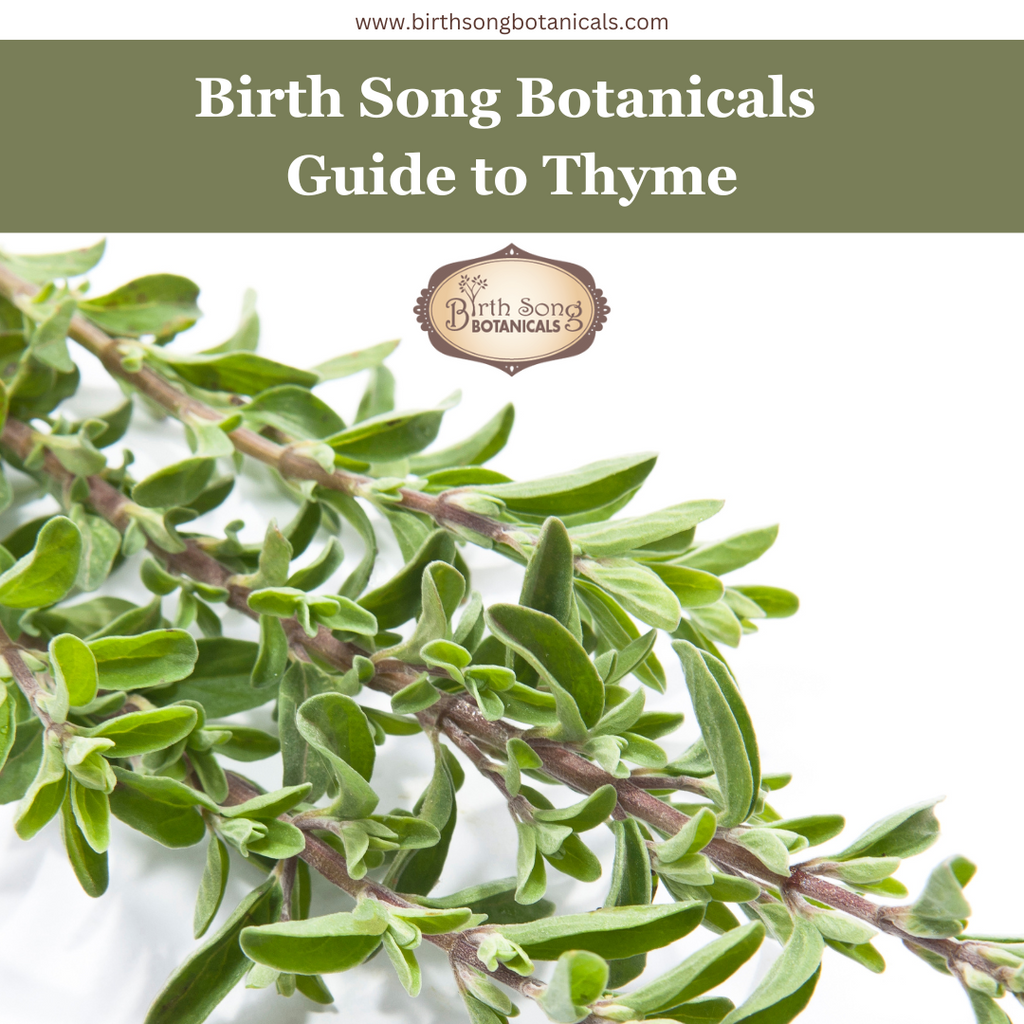The Birth Song Botanicals Guide to Thyme

Thyme, Thymus vulgaris is a herb many recognize by name, and some even by taste or smell. Not as many, however, are aware that beneath its distinctive and flavorful qualities, thyme is densely loaded with a variety of medicinal characteristics, making it hardly an after-thought ingredient. Today we dive into the history and health benefits of thyme, a herb of nearly 300 varieties, and highlight why you might consider making it a staple in your everyday culinary and kitchen herbal practice.
As Old As Thyme Itself
The medicinal qualities of thyme are no secret. For thousands of years, it has been a megastar of the herb world, cultivated by ancient Greeks, Romans, and Egyptians alike. In many of these empires, it was thought to act as an antidote for poison if ingested or bathed with. In this era, thyme was also thought to provide protection, courage, and strength.
- Roman soldiers exchanged sprigs as a sign of respect. They also bathed with thyme before a battle to protect them and make them strong.
- Greeks and Roman people burned thyme to purify their temples and homes, and to evoke a spirit of courage in those who inhaled it.
- Egyptians used it during their embalming process and burial rites.
- During the mid-1300s, when the Black Plague tragically hit Europe, much of the afflicted or at-risk population turned to thyme in the form of essential oils, for protection, wearing it, consuming it, and applying it directly to plague-related ailments and wounds.

Later on, Victorian-era populations would use thyme in an attempt to combat infections, with nurses soaking bandages in thyme water. And all the while, monasteries and parishes throughout the ages would use it for culinary purposes and even food storage purposes, such as slowing the spoiling process of meats and poultries.
Thyme in Modern Times
Today, like other herbs and spices such as garlic, ginger, rosemary, and sage, thyme is still widely used in medicine and cooking. Through the advent of more modern methods of medicinal analysis, the health benefits of thyme (fresh, dried, and oil) are now more apparent than ever before. For starters, thyme contains an active ingredient known as thymol, which has antibacterial and antiviral features and thus can help manage issues ranging from infected acne, candida, and athletes foot to ones like the common cold. If used during your daily hair regimen, thyme essential oil may prevent hair loss by improving blood circulation in the scalp region.

The herb itself is brimming with vitamins and minerals that promote healthy heart activity. It may even provide anti-swelling relief to those with chronic inflammation. It’s high vitamin A content is great for eyesight and mitigating ocular diseases, and its soothing capabilities when steeped as a tea serve to aid sleep. Beyond all this, it is thought to help treat coughs, bronchitis, anemia, and potentially even prevent cancer. Finally, if you’re not ailing from any of that, but simply watching your sodium intake, it does wonders when replacing salt in a dish. What can’t thyme do!

Side Effects and Considerations:
While it’s supplemental range is vast, there are some potential side-effects to consider when ingesting or applying the thyme plant for its benefits.
Be cautious when administering large doses of thyme or thyme oil to children. Thyme in the right amount is a wonderful herb for children! Likewise, be careful about how much you use if you are pregnant and/or breastfeeding. In both cases, while potential issues caused by amounts used for cooking are likely negligible, it’s unknown if larger amounts taken or applied directly may be harmful. If you are diagnosed with a bleeding disorder or have surgery planned, it’s worth knowing that some studies are suggesting thyme might slow blood clotting and could lead to various related complications. Finally, if you are afflicted by a condition that is worsened by exposure to estrogen, think twice before using thyme, since it tends to act similarly to estrogen when introduced into the female body.
Thyme to Consider Birth Song Botanicals
At Birth Song Botanicals, we care about you and your baby’s well-being, which is why we use herbs like thyme to create supplements, remedies, and tinctures that will help keep you naturally healthy and happy. Try our Elderberry Complex to mitigate the effects of chronic allergies, inflammation, and cold and flu symptoms. If you’re looking for thyme-infused products to maximize your children’s health and well-being, try our Children’s Respiratory Support Herbal Tincture or our Children’s Healing Herb Bath. Both of these child-oriented products will help support your children’s overall well-being and stave off chronic infections, allergies, and support their growth and development.
More Herbal Support for Families
At Birth Song Botanicals, we’re dedicated to supporting your family’s wellness naturally. Check out our Children's Collection for more herbal remedies, including immune-boosting tinctures, teas, and supplements designed to keep your family healthy, resilient, and thriving.
And enroll in our free Herbs For Kids Course and learn even more herbal recipes!
I sincerely hope you all have a great season and these tips help your family stay healthy!
Hugs,
Maria
🌿
*Disclaimer: This blog post, and all the blog posts on Birth Song Botanicals is for for educational purposes only. It is written in the spirit of education and empowerment. It in no way intends to treat, diagnose or cure any disease. What you do with this information is entirely up to you.
🌿 Want More? Check these out! 🌿
Herbs For Kids Ebook and Online Course
Herbal Remedies for Back to School
Back to School Resilience: Three Herbal Remedies for Kids Immune Systems
When to Seek Medical Help if Your Child Is Sick
Natural Oral Rehydration Therapy for Rotavirus and Norovirus
Herbal Earache Remedies- Video Series
RSV From Mild to Severe What You Need to Know
Calming Coughs & Colds With Elderberry & Thyme
Everything You Need To Know About Herbal Baths
4 Herbs that Soothe Teething Symptoms
Children at Birth- Should you have your kids with you when you give birth?
How to Make DIY Elderberry Syrup Your Whole Family Will Love
Elderberry: Herbal Respiratory Support for Cough, Cold, and Flu Symptoms
4 of the Best Immune Boosting Herbal Teas for the Cold and Flu Season
Treat Childhood Fevers with Herbs
How To Treat A Fever With Herbs and Hydrotherapy
What Is A Fever? Is it a Friend or Foe?
When To Seek Medical Attention for a Fever
Three Herbal Remedies to Help You and Your Children Fight a Cold
Guide To Children's Coughs, Colds & Flus
Making a Children's Herbal Travel Kit
The Benefits of Using Herbs for Kids
Soothe an Upset Stomach with Herbs
5 Herbal Cough Remedies For Kids
Stay Healthy As You Travel with Kids This Holiday Season
Earache Relief Oil: What's Behind The Blend?
The Birth Song Botanicals Guide to Thyme
Immune Boosting Herbs for Kids
Everything You Need to Know About Herbal Tinctures
Plantain: Nature's Best Anti-Itch Bug Bite Relief Remedy
How To Treat A Sunburn Naturally
Making Herbal Food with Astragalus Root
The Origin Story of Birth Song Botanicals
Would You Like My Help Choosing the Herbal Remedy Specifically For you?
Remember to:
Like our Birth Song Botanicals Facebook Page
Follow Birth Song Botanicals Co. on Instagram
Read our Birth Song Botanicals Blog
Watch Birth Song Botanicals on Youtube
Listen to Birth Song Botanicals on SoundCloud
Be inspired by Birth Song Botanicals on Pinterest




